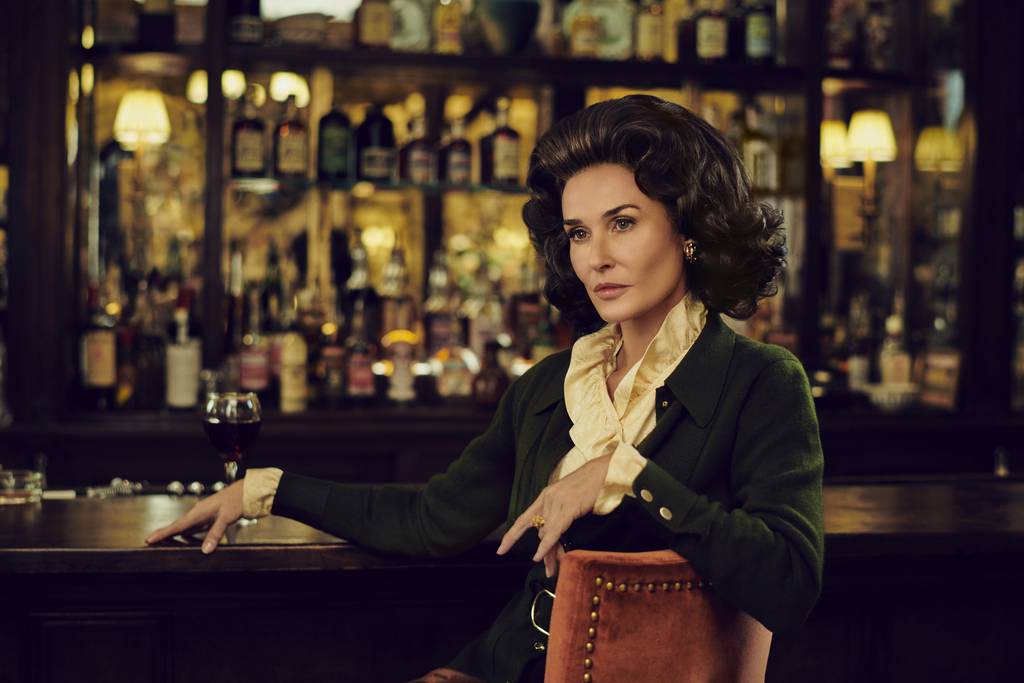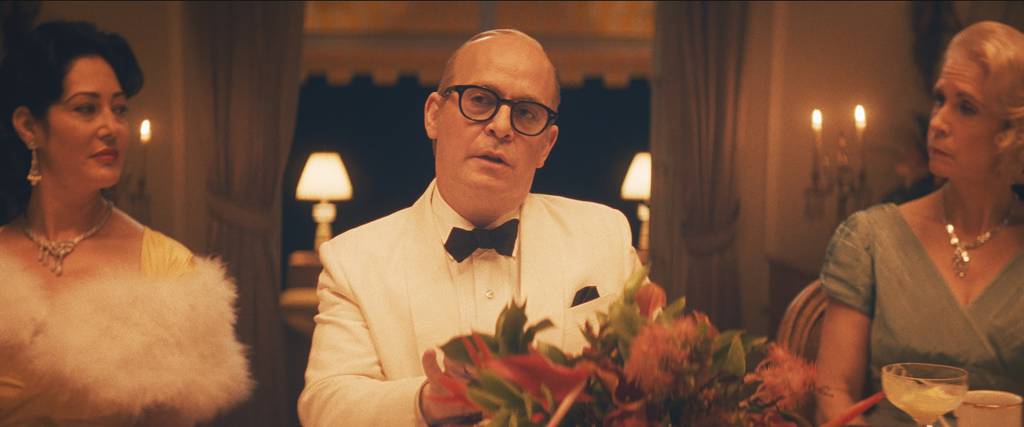[ad_1]
When the biography of Truman Capote was published in 1997, review This article from the Denver Post summed up his unique place in pop culture to its core: “The uneducated attacker From Monroeville, Alabama, he sneaked into the postwar jet set as court jester, raconteur, confessor, party-goer and giver, scandal monger and manipulator. Decades before gay liberation, he wore his homosexuality like a flashy badge of honor. “It’s easy to forget that he actually wrote a book.”
These books included “Breakfast at Tiffany’s” and “In Cold Blood.” His latest (and ultimately unfinished) work is at the center of the FX series “Feud: Capote vs. The Swans.”
After the huge success of “In Cold Blood,” Capote turned his professional attention to his friends, the women of New York’s wealthy elite—his Swans, as he called them. The book was lightly fictionalized but would tell everything in a brutal way. Esquire magazine published the first chapters in the mid-70s, and the result scandal. The first-class bird droppings hit the fan and the Swans expelled him from their social circle. Capote’s world collapsed.
The book project was an albatross, and Capote was struggling with writer’s block, due in part to his drowning in addiction to pills and alcohol. But also: An exposé only works when you’re willing to expose the ugliest truths and let things fall where they may. Capote was pained, even shocked, by this bargain and lived to regret it.
This is the second season of FX’s “Feud” anthology series, which premiered in 2017 and focuses on the tense relationship between Hollywood stars Bette Davis and Joan Crawford. Ryan Murphy once again serves as executive producer, but this time Jon Robin Baitz becomes the showrunner and writer for all eight episodes, bringing a sharp energy to the series in a smart and lively way.
This brilliance dissipates in the final two chapters when the death of Capote and one of his Swans arrives. Like the show’s main character, perhaps Baitz may have finally lost his nerve. Even so, everything that came before is some of the best television of recent times.
On the big screen, Philip Seymour Hoffman won an Oscar for his 2005 film “Capote.” A year later, Toby Jones portrayed him in the movie “Infamous”. But the FX series feels like the definitive version starring British actor Tom Hollander. (The range includes everything from “Gosford Park” to the Italian season of “The White Lotus.”)
Hollander captures all of Capote’s external characteristics—his appearance, his nasally voice, and his distinctive demeanor—but also his soul. He plays Capote as a man who is truly aware of his flaws. This is a performance that understands the power of panache, of putting a cigarette to one’s mouth and taking a drag before taking it out with the other hand. (The fidelity of the period means everyone is constantly lighting up; the show’s cigarette budget must be eye-popping.)
Baitz surrounded Hollander with players who understood the teeth-gnashing entitlement of the Swans, who lunched at La Côte Basque and constantly vied for status like the boring but popular girls in the high school cafeteria.
Naomi Watts is Babe Paley (wife of media executive William S. Paley), the faux-calm, helmeted perfectionist who is the queen bee and Capote’s favorite. Diane Lane is the beautiful but vindictive Slim Keith (she was married to several Hollywood bigwigs before becoming a banker). Chloë Sevigny is a CZ Guest who is much more than meets the eye, with her bouncy blonde hair and days spent gardening and horseback riding (she was the best man at his Ernest Hemingway wedding).
Calista Flockhart plays the elegant and fragile Lee Radziwill (trapped in a toxic rivalry with her sister Jackie O), and Demi Moore plays Ann “Bang Bang” Woodward, who shot her husband when she mistook him for a thief, but is said to have killed him. on purpose. (Capote was more than willing to fan the flames of this speculation.)
These names will be familiar to anyone who lived through the 1960s and 1970s and to regular readers of Vanity Fair magazine. For everyone else, the show offers a delicious opportunity to fall down internet rabbit holes and dig up backstories. These businessman wives have created stylized personas for themselves, which requires stylized performances from the cast, but still adheres to realism. The result is some of the best work of their careers. (Someone should cast all of these in a remake of “The Women.”)

Baitz captures Capote’s humor and insight with real intelligence, but also captures his cruelty, manipulations, and self-delusions. At one point, Capote is followed by documentary filmmakers Albert and David Maysles as he prepares for his famous Black and White Ball in 1966. The Maysles actually produced a half-hour documentary with Capote that year, in which he pontificates about writing “In Cold Blood.” But the FX series takes a different approach: What if they filmed her with her socialite friends instead?
This is a terrific premise because it allows Capote to be interviewed by himself, and he speaks in clear but contemplative terms about why he is so attracted to these women. She craves their attention and the trappings of their lifestyle, and perhaps this closeness was a way to repress her own insecurities and motherhood issues. “Our mothers give us our most ingrained patterns,” he tells the camera. “And mine was the torchbearer of unbreakable patterns.” (Jessica Lange plays Capote’s dead mother, who haunts him like a ghostly ghost following him from his grave.)
Despite his admiration, Capote sees the Swans for what they are. Boring. Uninspired. Catty. Ignorant about the world. It’s terrible for their children. He’s desperate to keep up appearances.
This becomes clear when he spends a day with fellow writer and straight shooter James Baldwin, who arrives to snap Capote out of his self-pitying stupor. It’s the best episode of the season, and although Chris Chalk looks nothing like Baldwin, he gives a hilarious and on-point performance, using voice and verbal rhythms just right.
“My swans would never do that; have lunch alone with a black man,” Capote says.
“I know, it’s not news,” Baldwin replies, forcing her to talk about the racism and classism of this world she idolizes. Capote doesn’t need much encouragement. Then he pauses. “I spend so much time with them, how can I not be guilty too?”
“Of course you are,” Baldwin replies. “The question is how do you address this?”
Their back-and-forth movement is vital because it prevents the series from succumbing to the fetishization of vain vanity in recent television portrayals of the rich and dysfunctional. “Your book is the firing squad that killed the Romanovs,” Baldwin told him. “It is your guillotine that beheaded Marie Antoinette.” But Baldwin misunderstands this, because the literary destruction of the rich and corrupt does not kill them, but only centers their emotions. And people will eagerly devour it. See HBO’s response “Subrogation.”
Still, I laughed at the contrast “Feud” draws between the glitzy, ostentatious elegance of a New York dinner party and Capote’s casual encounters in the more relaxed but relatively dull California when he was welcomed home to Los Angeles after exile. The role of Joanne Carson (Johnny Carson’s wife) played by Molly Ringwald. Through Capote’s eyes, you can see why the second setting is so inadequate.
Capote saw his falling out with the Swans as a great tragedy. But were any of them, including Capote, capable of true friendship? They had fun together. And sincerity. But closeness is not necessary friendship.

A marvel of costumes and period detail, the series is richly executed and engaging but also unexpectedly moving. Capote is a clown who is both cheerful and sad. As an anthropologist from America’s ruling class, he judged them but also desired their love. He wanted it both ways.
“We’re Pomeranians to them,” he says in one of his more conscious moments, “there to cuddle when they need something soft to hold on to. But whether we snarl or show our teeth, it’s a pound and a half.”

What to Watch?
Weekly
The latest from Tribune critics on what movies and television you should watch.
Perhaps being their lapdog had not only tangible advantages, but psychological advantages as well. Or maybe Capote didn’t have the courage to back up his beliefs.
In 1970, Stephen Sondheim mocked the dandies of New York in his song “The Lady Who Lunch,” distorting their frivolous, performance-based, over-indulged lives: “Another chance to disapprove, another great song/One more reason not to act.” , another shot of vodka.”
I’ll drink to this, it moves on to the next line. It’s a sentiment Capote takes seriously.
“The Trial: Capote vs. the Swans” — 3.5 stars (out of 4)
Where to watch: Wednesdays at 9pm on FX (and streaming on Hulu)
Nina Metz is a Tribune critic.
nmetz@chicagotribune.com
 Best American Comics News bestamericancomics.com started its broadcasting life on December 21, 2022 and aims to offer original content to users. Aiming to share information in technology, science, education and other fields, bestamericancomics.com aims to provide its readers with the most up-to-date and comprehensive. Since the content of the site is created by expert writers, readers are reliable and accurate referrers.
Best American Comics News bestamericancomics.com started its broadcasting life on December 21, 2022 and aims to offer original content to users. Aiming to share information in technology, science, education and other fields, bestamericancomics.com aims to provide its readers with the most up-to-date and comprehensive. Since the content of the site is created by expert writers, readers are reliable and accurate referrers.


